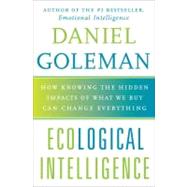
Note: Supplemental materials are not guaranteed with Rental or Used book purchases.
Purchase Benefits
What is included with this book?
DANIEL GOLEMAN is the author of the international bestsellers Emotional Intelligence (more than 5 million copies sold worldwide), Working with Emotional Intelligence, and Social Intelligence, and the co-author of the acclaimed business bestseller, Primal Leadership. He was a science reporter for The New York Times, was twice nominated for the Pulitzer Prize, and received the American Psychological Association’s Lifetime Achievement Award. He lives in the Berkshires.
The New copy of this book will include any supplemental materials advertised. Please check the title of the book to determine if it should include any access cards, study guides, lab manuals, CDs, etc.
The Used, Rental and eBook copies of this book are not guaranteed to include any supplemental materials. Typically, only the book itself is included. This is true even if the title states it includes any access cards, study guides, lab manuals, CDs, etc.
Excerpted from Ecological Intelligence: How Knowing the Hidden Impacts of What We Buy Can Change Everything by Daniel Goleman
All rights reserved by the original copyright owners. Excerpts are provided for display purposes only and may not be reproduced, reprinted or distributed without the written permission of the publisher.